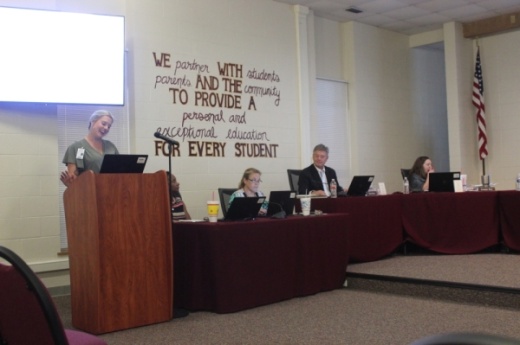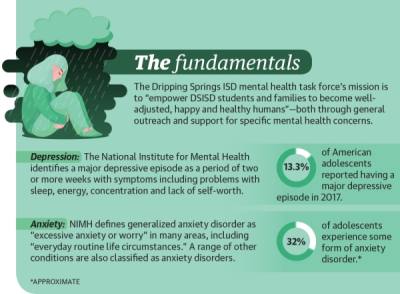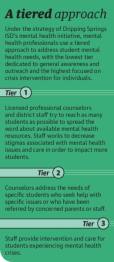“Prior to the passing of state legislation regarding mental health in schools, DSISD was proactively addressing what we could do to support our students,” Washburn said.
District Intervention Coordinator Wendy Kubenka agreed.
“I think we’re ahead of the game,” she said in a January interview with Community Impact Newspaper.
At a Sept. 23 meeting of the DSISD board of trustees, Kubenka shared the task force’s planned mental health strategies—and statistics pertaining to mental health struggles of students in the district. She said that DSISD’s counseling department had received reports of 21 suicide attempts by students in the previous year, and that 65 suicide assessments had been given to students exhibiting signs of suicidal ideation. In addition to treating those crisis cases, Kubenka said the district should implement strategies for earlier treatment and intervention.
Part of the solution was to hire mental health professionals to add to the efforts of general guidance counselors already on staff, whose attentions are divided by other duties, such as academic advisement. The new positions are supported by the Dripping Springs Education Foundation.
“The DSEF board had been looking for a specific area of focus that members of our community would be committed to supporting financially,” the foundation’s Executive Director Lou Mandy Bruggman said. “On a national scale, the mental health of children and adolescents has emerged as an area in need of attention. We were excited to partner with the district and community to proactively address how DSISD can be a leading district in supporting the mental health of students.”
Licensed professional counselors Stephanie Opiela and Kimberly Bird were hired to work with students at Dripping Springs High School and the district’s two middle schools, respectively, beginning Oct. 21. Bird, who also consults with employees at the district’s elementary schools, said mental health issues are gaining prevalence for younger students.
“This isn’t a Dripping Springs thing,” Bird said. “This is a society thing. [Students with mental health challenges] are becoming younger and younger.”
Across schools, Opiela said the goal was “reaching as many students as we can, but still providing quality care,” and working to decrease the stigma associated with mental health issues and seeking therapeutic help so that students feel comfortable seeking it out.
The DSISD Mental Health Initiative strategy identifies this type of care as Tier 1, aimed at all students. During Tier 2 care, counselors address the specific needs of specific students, and during Tier 3 care, intervention and care is provided to students in crisis.
These new hires have also assisted in a districtwide effort to give all of the approximately 1,000 DSISD employees mental health first aid training so that teachers and staff are prepared to appropriately address students in distress and direct them to resources. For her part, Kubenka said the training taught her to validate the feelings of students with a supportive response: “I understand. It’s only normal.”
The majority of DSISD employees have already received mental health first aid training, according to Kubenka. Employees also have new access to their own mental health resources through a contract with Dear Oaks Mental Health Associates.
As the mental health initiative moves forward, Kubenka said trainings for parents through organizations such as the Parent Teacher Association are ongoing, including a recent training that was held in February, so that the community can understand and support the district’s efforts with mental health.







